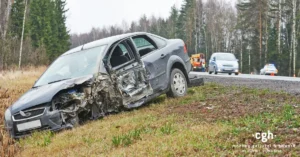When a family member dies in a car accident, you have to deal with not only the emotional toll but also the legal and financial problems that can arise as a result of the death. In Denver and the rest of Colorado, some people have the right to file a claim when someone they love dies in a car accident due to another person’s carelessness. Some may wonder who is allowed to sue in a Denver fatal car accident.
A wrongful death claim can help families secure compensation for the loss of a loved one. It is very important for family members going through such a terrible situation to understand who can file a wrongful death claim and when.
How To File a Wrongful Death Claim
A wrongful death claim is a legal action that a deceased person’s family brings against the party responsible for the fatal accident. This type of claim seeks compensation for the financial losses and emotional pain the survivors have endured since their loved one died.
A wrongful death claim can be filed after a fatal car accident if the accident was caused by the negligent actions of another person, including:
- Texting and driving
- Driving while under the influence of drugs or alcohol
- Driving too fast or carelessly
- Not following the rules of the road
- Driving with obvious, avoidable, and/or risky car issues (such as an obstruction on your windshield)
As part of a wrongful death claim, proving liability involves showing that the negligent party directly caused the accident that resulted in the wrongful death. Survivors in Denver only have a certain amount of time to file this kind of claim, so it’s important to become familiar with the legal process as soon as possible.
Who Can File a Claim for Wrongful Death in Denver?
In Colorado, generally, only those who were close to the deceased and were seriously affected by their death can file a claim. The rules regarding who can file a claim depend on a number of factors, including the timeframe following the fatal accident.
- Surviving spouse. In the first few weeks after the death of a partner, the surviving spouse is allowed to seek compensation for the loss. The spouse may also choose to include the children of the deceased in the case, but it is up to the children alone to decide to file. This allows the spouse the time to make decisions without interference from others.
- Children of the deceased. If the surviving partner doesn\’t file a wrongful death claim in the first year following the accident, the biological or adopted children of the deceased may do so in the second year. At the start of the second, the children can file a case on their own or with the surviving spouse.
- The deceased’s parents. If the deceased person had no spouse and no children at the time of the car accident, their parents may be allowed to file a wrongful death case. This is often the case when young adults die in crashes. In these situations, the parents may be able to receive payment for the mental anguish and financial loss they\’ve suffered since their child died.
- The person in charge of the estate. The individual in charge of the deceased person’s estate can make a wrongful death claim. On behalf of the deceased’s estate, the person in charge may be able to secure payment for damages the deceased person incurred before and after their death. This could include hospital bills, funeral costs, lost wages, and the pain and suffering the deceased person experienced before they died.
Wrongful Death Claim Damages
In a wrongful death case, family members may be awarded both monetary and non-monetary damages, such as:
- Costs of the funeral and burial
- Costs of medical care due to the accident
- Loss of cash support (for example, money the deceased would have made in the future to support a family member)
- Pain and suffering
The goal of these damages is to help the family manage the financial problems they’ve had to deal with since the death and give them some form of justice.
FAQs
How Much Can Someone Sue for a Fatal Car Accident in Colorado?
The amount someone can sue for a fatal car accident in Colorado depends on a number of factors related to the case, including their financial dependence on the deceased, damage to the property, medical bills, the deceased’s income, and pain and suffering. The amount will vary based on the circumstances of each case.
How Long After a Fatal Car Accident Can You Sue in Colorado?
You usually have a couple of years from the date of the fatal car accident to sue for wrongful death in Colorado. To protect your legal rights, you must file your claim within the proper time frame. A car accident attorney can tell you the specific statute of limitations for your situation.
Can Someone Sue You for a Fatal Car Accident After Insurance Pays in Colorado?
Yes, you can still be sued for a fatal car accident in Colorado even after your insurance has paid out. This can happen if the person’s losses are more than your policy limit. They may file a claim against you to pursue additional compensation, especially if the accident was a result of your negligence. In such cases, you could be held legally responsible for paying the amount that exceeds your insurance coverage.
What Is the Law Regarding Fatal Car Accidents in Colorado?
In Colorado, fatal car accidents are based on who was at fault, meaning the person responsible for causing the accident is liable for damages. Drivers must have a certain amount of insurance, and if they are careless and cause an accident, they can be held responsible. Colorado follows the modified comparative negligence rule. Under this rule, a victim’s or their family’s compensation may be reduced based on their percentage of fault.
Contact Cheney Galluzzi & Howard
If your loved one was in a fatal car accident, you or your family may be entitled to compensation. Contact Cheney Galluzzi & Howard today for more information.


 Denver Spinal Cord Injury Lawyer
Denver Spinal Cord Injury Lawyer